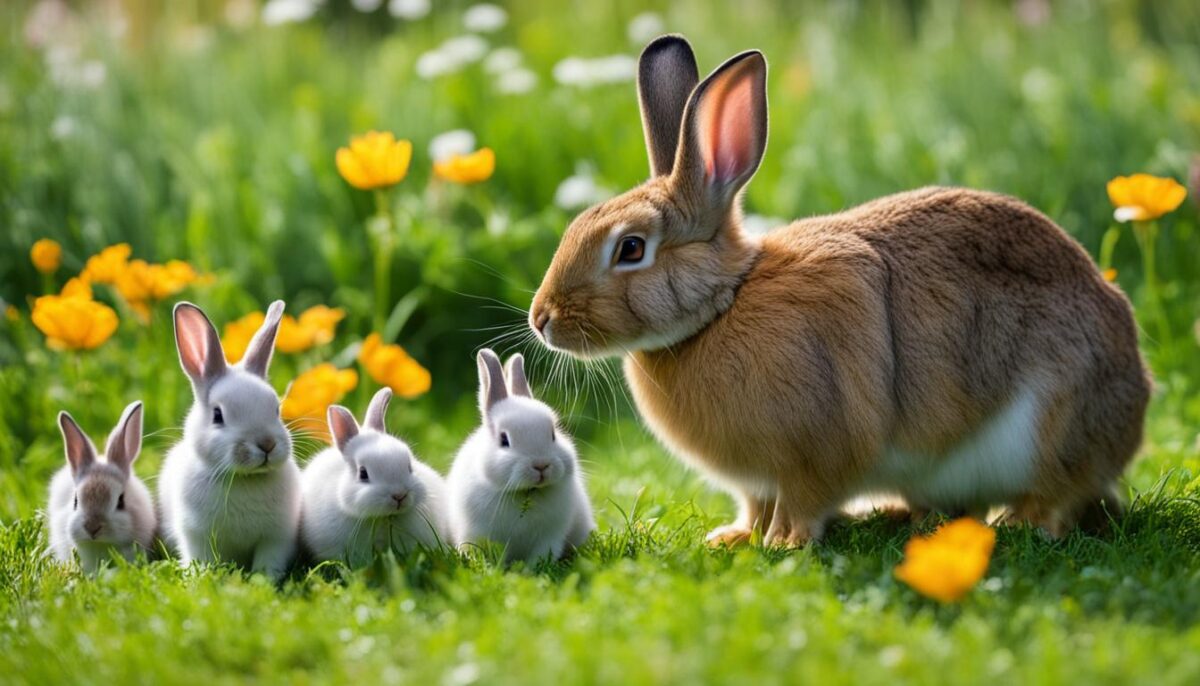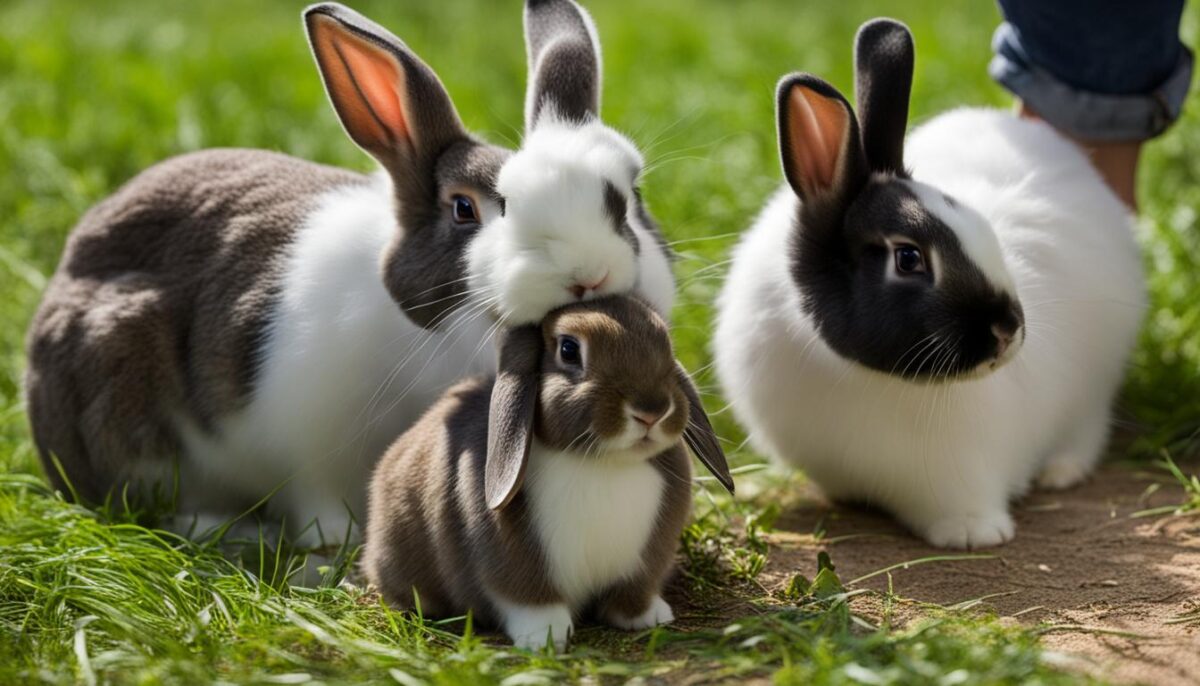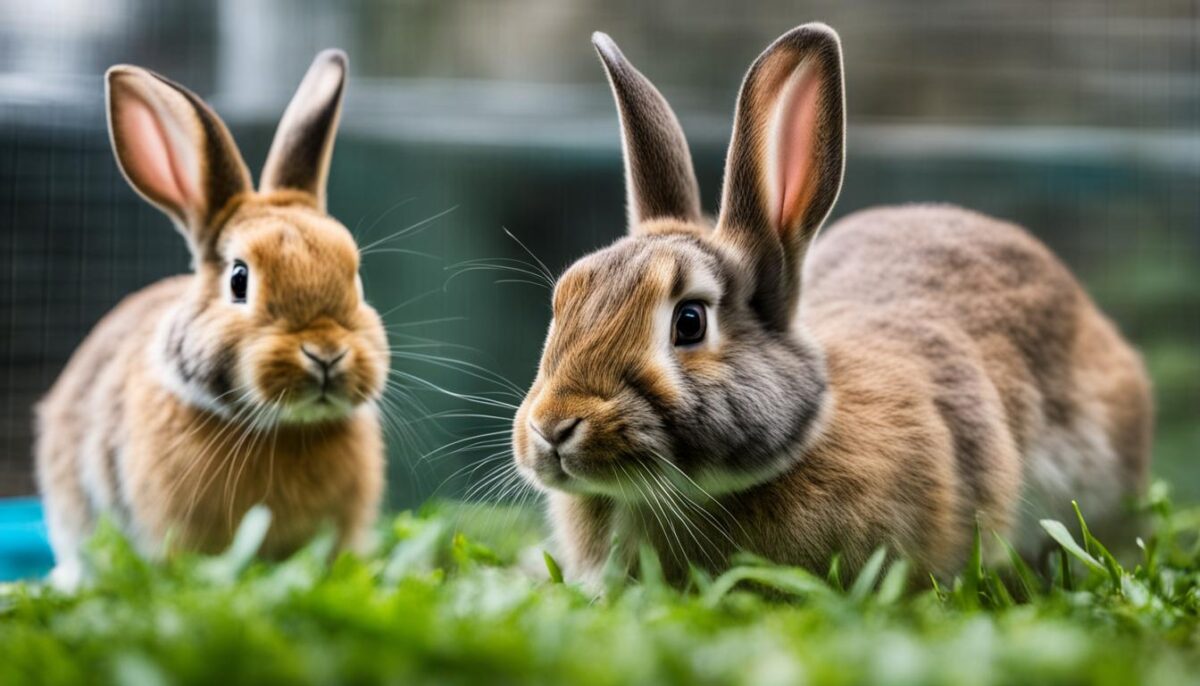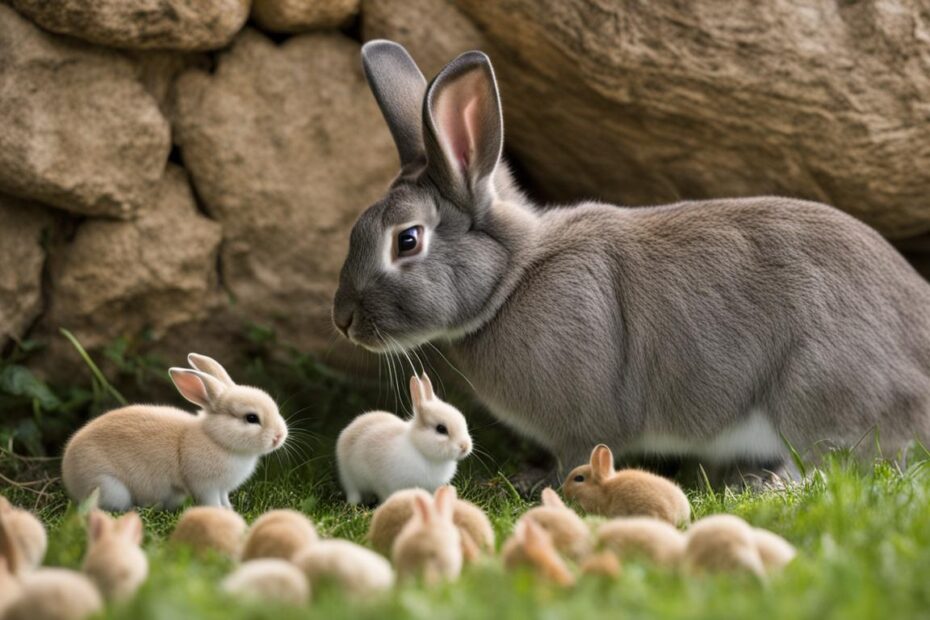Male rabbits may exhibit aggression towards newborn babies for various reasons, including territorial instincts, stress, and inexperience. It is important for rabbit owners to understand the reasons behind this behavior and take appropriate measures to ensure the safety of the babies.
Key Takeaways:
- Male rabbits may display aggression towards newborn babies due to territorial instincts, stress, and inexperience.
- Understanding the reasons behind male rabbit aggression towards babies is crucial for ensuring the safety of the offspring.
- Proper care, monitoring, and separation can help protect baby rabbits from potential male aggression.
- Behavior modification techniques, such as neutering, can help reduce aggressive behaviors in male rabbits.
- Responsible breeding practices contribute to the overall welfare and health of rabbits.
Reasons for Cannibalism in Rabbits
Cannibalism in rabbits can occur due to various reasons, including birth defects and stillborn babies, poor dietary protein, lack of resources, stressed mother rabbits, inexperience, and territorial instincts. Understanding these underlying factors is crucial for preventing and addressing cannibalistic behaviors among rabbits.
Many cases of cannibalism in rabbits are associated with birth defects and stillborn babies. When a baby rabbit is born with severe abnormalities or is stillborn, the mother may instinctively consume it to remove any potential threats to the rest of the litter. This behavior is more common in stressed or inexperienced mothers who may lack the ability to care for babies with special needs.
Inadequate dietary protein can also trigger cannibalism in rabbits. If a mother rabbit is not receiving sufficient protein in her diet, she may resort to eating her babies to compensate for the lack of nutrients. Providing a well-balanced diet rich in protein is essential for ensuring the health and well-being of both the mother and her offspring.
Lack of resources, such as space, food, or nesting materials, can also lead to cannibalism among rabbits. When resources are limited, the mother may perceive her babies as competition for these scarce resources and resort to cannibalism as a means of survival. Providing ample resources and creating a comfortable environment for the mother and babies can help reduce the risk of cannibalistic behaviors.
In conclusion, cannibalism in rabbits can be attributed to various factors, including birth defects, poor dietary protein, lack of resources, stress, inexperience, and territorial instincts. By addressing these underlying causes and implementing appropriate measures, such as providing a nutritious diet, ample resources, and a stress-free environment, rabbit owners can help prevent cannibalistic behaviors and promote the well-being of both the mother and her babies.
Why Do Male Rabbits Eat Their Young?
Male rabbit infanticide and offspring aggression are behaviors that can be observed in certain circumstances. Understanding the reasons behind these behaviors is essential for rabbit owners to prevent potential harm to their young and ensure the well-being of their rabbit family.
One possible reason why male rabbits eat their young is the desire to mate again. Male rabbits have a strong reproductive drive, and the presence of newborn babies can inhibit their ability to mate with the mother rabbit. In some cases, male rabbits may perceive the babies as competition and engage in infanticide to remove this obstacle and increase their chances of mating again.
Another factor that can contribute to male rabbit infanticide is territorial behavior. Male rabbits are territorial animals, and the presence of babies may trigger aggression as they perceive the offspring as intruders in their territory. This territorial instinct can lead to the male rabbit actively harming or even consuming the young rabbits, eliminating the perceived threat to their territory.
Male rabbit infanticide can also occur due to a lack of paternal instincts. Unlike some other animal species where males actively participate in parenting, male rabbits typically have limited involvement in raising their offspring. Their instincts may not align with nurturing or protecting the young, leading to aggression or even cannibalism.
It is important to note that not all male rabbits exhibit these behaviors, and the severity may vary among individuals. Additionally, environmental factors, the relationship between the male and female rabbits, and the overall health and well-being of the rabbits can also influence the occurrence of infanticide or aggression towards the young.
| Reasons for Male Rabbit Infanticide | Explanation |
|---|---|
| Desire to mate again | The presence of newborn babies can hinder the male rabbit’s ability to mate with the female rabbit, leading to infanticide to remove competition. |
| Territorial behavior | Male rabbits are territorial animals and may view their offspring as intruders in their established territory. |
| Lack of paternal instincts | Male rabbits have limited involvement in parenting, and their instincts may not align with nurturing or protecting the young. |
By understanding the underlying reasons for male rabbit infanticide and offspring aggression, rabbit owners can take appropriate measures to prevent or minimize the occurrence of these behaviors. Providing a separate living space for the mother and babies, closely monitoring the interactions between the male and female rabbits, and ensuring a stress-free and enriched environment are crucial steps in protecting the well-being of the young rabbits.
The Role of Mothers in Rabbit Nesting
Rabbit mothers have a vital role in nesting and ensuring the well-being of their young. They exhibit strong maternal instincts, which include cleaning and protecting the nest, as well as caring for their newborn babies. These instincts are crucial for the survival and development of the babies.
One important aspect of a rabbit mother’s role is nest cleaning. After giving birth, the mother will consume the placenta and clean the newborn babies. This behavior serves to minimize scent and reduce the risk of attracting predators to the nest. While this cleaning instinct is natural and necessary, in some cases, the mother’s cleaning behavior may become excessive or unintentionally harm the babies.
Rabbit mothers also play a role in maintaining the cleanliness of the nest by removing any waste or soiled bedding. This helps to create a comfortable and hygienic environment for the babies to grow. Additionally, the mother will provide warmth and protection by covering the babies with fur and keeping them close to her body.
Table: Rabbit Mother’s Nest Cleaning Behavior
| Behavior | Description |
|---|---|
| Consuming placenta | The mother eats the placenta to minimize scent and reduce the risk of attracting predators. |
| Cleaning newborn babies | The mother cleans her babies to remove any debris and maintain their hygiene. |
| Removing waste | The mother removes any waste or soiled bedding from the nest to keep it clean. |
| Providing warmth and protection | The mother covers the babies with fur and keeps them close to her body for warmth and protection. |
While the mother’s instinct to clean and protect her babies is essential, it is essential for rabbit owners to monitor the nesting behavior closely. If the mother’s cleaning behavior becomes excessive and poses a risk to the babies, intervention may be necessary. Seeking guidance from a veterinarian or experienced rabbit breeder can help ensure the well-being of both the mother and her offspring.

Prevention and Care for Rabbit Mothers
Preventing infanticide in rabbits and providing proper care for rabbit mothers is essential for the well-being of both the mother and her babies. By taking proactive measures and ensuring a nurturing environment, you can minimize the risk of aggression and promote a healthy bond between the mother and her offspring.
Checking the Nest
Soon after the birth of the babies, it is crucial to check the nest to ensure everything is in order. Remove any deceased babies and ensure that the nest is clean and comfortable. This will help maintain a hygienic environment and reduce the likelihood of the mother displaying excessive cleaning behavior that could harm the babies.
Providing Adequate Nutrition
A balanced and nutrient-rich diet is vital for the overall health of the mother and her babies. Ensure that the mother rabbit has access to fresh water and a high-quality rabbit diet that meets her nutritional requirements. Consult with a veterinarian to determine the appropriate diet and feeding schedule.
Creating a Stress-Free Environment
Rabbits are sensitive creatures, and stress can significantly impact their behavior. Provide a calm and peaceful environment for the mother rabbit by minimizing loud noises, sudden changes, and disturbances. This will help reduce stress levels and create a safe space for the mother and her babies to thrive.
| Preventive Measures | Benefits |
|---|---|
| Checking the nest regularly | Ensures cleanliness and minimizes the risk of harm to the babies |
| Providing a balanced diet | Promotes optimal health and growth for the mother and her babies |
| Creating a stress-free environment | Reduces the risk of aggression and creates a nurturing space for bonding |
By following these preventive measures and providing the necessary care, you can support the well-being and safety of rabbit mothers and their babies. Remember to consult with a veterinarian for personalized advice and guidance based on your specific circumstances.
Understanding Male Rabbit Behavior
Male rabbits exhibit specific behavior patterns when it comes to the presence of babies. Understanding these behaviors can provide insights into their hierarchy, parenting behavior, and territoriality.
Male Rabbit Hierarchy with Babies: When babies are born, male rabbits may establish a hierarchy within the group. Dominant males typically assert their authority and may display protective behavior towards the babies, ensuring their safety within the group.
Male Rabbit Parenting Behavior: Some male rabbits exhibit nurturing and protective behavior towards the babies. They may engage in grooming and even help care for the newborns, sharing some of the parenting responsibilities with the mother.
“Male rabbits may establish a hierarchy within the group and display protective behavior towards the babies, ensuring their safety within the group.”
Male Rabbit Territoriality and Babies: Male rabbits can become territorial when babies are present. This territorial behavior is driven by their instinct to protect their territory and the resources within it. In some cases, this territoriality can lead to conflicts with the mother and the offspring.
Table: Male Rabbit Behavior towards Babies
| Behavior | Description |
|---|---|
| Hierarchy | Establishment of authority and protective behavior towards babies. |
| Parenting | Nurturing and grooming behavior, sharing parenting responsibilities with the mother. |
| Territoriality | Defense of territory and potential conflicts with the mother and offspring. |
Understanding male rabbit behavior in the presence of babies can help rabbit owners better manage their rabbit groups and ensure the overall well-being of the mother and her offspring.

Behavior Modification for Aggressive Male Rabbits
Aggressive behavior in male rabbits can pose a risk to the safety of their offspring. Fortunately, there are behavior modification techniques that can help mitigate this aggression and create a harmonious environment for the entire rabbit family. Two effective methods for addressing aggressive behavior in male rabbits are neutering and training.
Neutering, or castration, is a surgical procedure that removes the testes of the male rabbit. This can have a significant impact on reducing aggressive tendencies, as it eliminates the influence of testosterone, the hormone responsible for territorial behavior and aggression. Neutering not only reduces the risk of harm to the babies but also promotes a calmer and more sociable temperament in male rabbits.
Training is another valuable tool for modifying aggressive behavior. By using positive reinforcement techniques, such as rewards and praise, male rabbits can be taught to associate positive experiences with their offspring. Training sessions can focus on teaching the male rabbit to approach the babies gently and calmly, reinforcing good behavior and redirecting aggression towards more appropriate outlets.
Benefits of Behavior Modification
Behavior modification for aggressive male rabbits offers several benefits. Firstly, it reduces the risk of harm to the babies, ensuring their safety and well-being. Secondly, it fosters a more peaceful coexistence between the male rabbit and the mother, creating a stress-free environment that supports healthy development. Lastly, behavior modification techniques contribute to the overall welfare of the male rabbit, promoting a happier and more balanced temperament.
| Behavior Modification Techniques | Benefits |
|---|---|
| Neutering | – Reduces aggression and territorial behavior – Promotes a calmer temperament – Decreases the risk of harm to babies |
| Training | – Teaches positive association with offspring – Reinforces gentle behavior – Redirects aggression towards appropriate outlets |
Implementing behavior modification techniques for aggressive male rabbits requires careful consideration and consultation with a veterinarian or certified animal behaviorist. They can provide guidance on the most suitable approach for individual rabbits and tailor a behavior modification plan to meet their specific needs. By addressing aggression through behavior modification, rabbit owners can create a safe and nurturing environment for their furry family members.

The Importance of Proper Breeding Practices
When it comes to breeding rabbits, following proper practices is essential for the welfare and health of both the rabbits and their offspring. Understanding the breeding age for rabbits and the risks of early breeding is crucial in ensuring successful and safe breeding experiences.
By waiting until rabbits are of appropriate breeding age, which is typically around six to eight months old depending on the breed, you can minimize the risks associated with early breeding. Breeding rabbits before they have fully matured can lead to complications such as pregnancy and birth difficulties, increased mortality rates among the offspring, and health issues in the mother.
Proper breeding practices also include providing a stress-free environment for the rabbits, ensuring they have a balanced and nutritious diet, and monitoring their health regularly. Regular veterinary check-ups and consultations are advisable to ensure the health and well-being of both the mother and the babies.
| Benefits of Proper Breeding Practices | Risks of Early Breeding |
|---|---|
|
|
By adhering to proper breeding practices, you can help ensure the long-term health and vitality of your rabbits. Responsible breeding practices contribute to the well-being of the rabbits, reduce the incidence of complications, and increase the chances of successful breeding experiences.

Key Takeaways:
- Wait until rabbits are of appropriate breeding age to minimize the risks of early breeding.
- Early breeding can lead to complications, increased mortality rates, and health problems in rabbits.
- Provide a stress-free environment and balanced diet for rabbits.
- Regular veterinary check-ups are crucial for monitoring the health of the mother and babies.
- Proper breeding practices contribute to the overall welfare and health of rabbits.
Conclusion
In conclusion, understanding the behavior of male rabbits towards babies is crucial for rabbit owners. By gaining insights into male rabbit aggression towards babies, we can implement appropriate measures to ensure the safety and well-being of the offspring.
Through this article, we have explored the various reasons behind male rabbit aggression, such as territorial instincts, stress, and inexperience. We have also delved into the topic of cannibalism in rabbits, understanding the triggers and addressing the underlying issues to prevent such behaviors.
Furthermore, we have discussed the importance of maternal instincts in rabbit nesting and the role of rabbit mothers in keeping their babies safe. We have highlighted the significance of proper care for rabbit mothers and the essential steps to prevent infanticide among rabbits.
By embracing responsible breeding practices and taking proactive measures to protect baby rabbits from male aggression, we can ensure a harmonious environment that supports the well-being of both the mother and her babies.
FAQ
Will male rabbits kill babies?
Male rabbits may exhibit aggression towards newborn babies for various reasons, including territorial instincts, stress, and inexperience. It is important for rabbit owners to understand the reasons behind this behavior and take appropriate measures to ensure the safety of the babies.
What are the reasons for cannibalism in rabbits?
Cannibalism in rabbits can be triggered by several factors, such as birth defects and stillborn babies, poor dietary protein, lack of resources, stressed mother rabbits, inexperience, and territorial instincts. It is crucial to address these issues to prevent cannibalism among rabbits.
Why do male rabbits eat their young?
Male rabbits may engage in infanticide or exhibit aggression towards their offspring due to various reasons, including the desire to mate again, territorial behavior, or a lack of paternal instincts. Understanding these reasons can help in preventing such behaviors.
What is the role of mothers in rabbit nesting?
Rabbit mothers play a crucial role in nesting and maintaining the cleanliness of the nest. They may consume placenta and clean their newborn babies to minimize scent and reduce the risk of attracting predators. However, in some cases, their cleaning instincts may go too far, leading to unintentional harm to the babies.
How can I prevent infanticide in rabbits?
Preventing infanticide in rabbits involves taking proactive measures, such as checking the nest soon after birth, removing any deceased babies, providing adequate nutrition, and ensuring a stress-free environment for the mother. Proper care and monitoring are essential to support the well-being of both the mother and her babies.
What is the behavior pattern of male rabbits towards babies?
Male rabbits exhibit specific behavior patterns when it comes to the presence of babies. They establish a hierarchy within the group, may display protective parenting behavior, and can become territorial, leading to potential conflicts with the mother and the offspring.
Will handling baby rabbits cause the mother to reject them?
Contrary to popular belief, handling baby rabbits does not typically lead to the mother rejecting them. It is important to handle baby rabbits from birth to promote bonding and socialization. However, it is generally advised not to separate mother rabbits from their babies unless there are specific risks or concerns, as babies should stay with their mothers for at least eight weeks.
How can I protect baby rabbits from male aggression?
To protect baby rabbits from potential male aggression, it is recommended to separate the male from the mother and babies, provide a safe and separate living space for the mother and her offspring, and monitor their interactions closely. Proper precautions can help ensure the safety and well-being of the babies.
How can I modify aggressive behavior in male rabbits?
Behavior modification techniques, such as neutering male rabbits, can help reduce aggressive behaviors towards babies. Training and socialization can also play a role in managing male rabbit aggression. Consultation with a veterinarian or animal behaviorist is recommended for guidance on behavior modification strategies.
What are the importance of proper breeding practices?
Engaging in proper breeding practices, including waiting until rabbits are of appropriate breeding age, can help minimize risks associated with male aggression and other potential complications. Responsible breeding practices contribute to the overall welfare and health of rabbits.
What insights can be gained from understanding rabbit behavior?
Understanding the complex dynamics of rabbit behavior, including male aggression towards babies, can provide valuable insights for rabbit owners. By implementing proper care, handling, and breeding practices, it is possible to create a safe and harmonious environment for both the mother and her babies.


